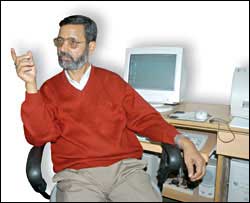 Bhutani civil rights activist Tek Nath Rizal arrived in Kathmandu this week just as preparations got underway for the 15th round of bilateral ministerial talks to end the refugee crisis. The talks start next week in Thimpu.
Bhutani civil rights activist Tek Nath Rizal arrived in Kathmandu this week just as preparations got underway for the 15th round of bilateral ministerial talks to end the refugee crisis. The talks start next week in Thimpu. Rizal is highly regarded in liberal democratic circles for his struggle on behalf of 100,000 Bhutani refugees who have been living in camps in eastern Nepal for the past 12 years. Rizal was a National Assembly member for 17 years, and in Bhutan's Royal Advisory Council where he was known for his stand against corruption.
Rizal's travails began in 1988, when he, along with DP Bhandari, petitioned King Jigmi Singye Wangchuk about the discrimination against ethnic Nepali Lhotsampas in the census which was seen then as an attempt to curb the Lhotsampa who made up 40-50 percent of the population. The Sharchops constituted some 40 percent and the Ngalops 20 percent. The Lhotsampas had been granted citizenship in a 1958 royal edict, but Thimpu considered them dangerous not just for their numbers, but also for their increasingly democratic politics, and their imagined or real affiliation with the Gorkhaland movement.
Rizal was briefly jailed for submitting the petition, which was deemed seditious. Upon release he came to Nepal to head the People's Forum for Human Rights, but in November 1989 the Panchayat government extradicted him to Bhutan. He was jailed under inhumane conditions for over a decade under a National Security Act promulgated three years after his arrest. In 1993, a royal edict stated that Rizal would be released only once the refugee crisis was solved. Yet, for reasons that remain unclear, he was released in 1999.
"I was really very hopeful when the government released me from jail," Rizal told Nepali Times in an exclusive interview. "I thought the government would also free the Lhotsampas from the refugee camps."
But 14 rounds of talks later, there has been no workable solution to the refugee crisis. The classification of refugees into four groups, in particular, dashed hopes that they might all someday return to their homeland. The four classes are: bonafide Bhutani who may have been forcefully evicted, Bhutani who emigrated, non-Bhutani, and Bhutani who have committed criminal acts.
 Says Rizal, "There was no need to divide the Bhutani people into four classes. There should have only been two classes: Bhutani and non-Bhutani." Rizal also objects to the stringent conditions the Bhutani government would place even on those who would qualify to return. "Even those who go back stand to suffer," he says.
Says Rizal, "There was no need to divide the Bhutani people into four classes. There should have only been two classes: Bhutani and non-Bhutani." Rizal also objects to the stringent conditions the Bhutani government would place even on those who would qualify to return. "Even those who go back stand to suffer," he says. Living precariously in exile, Rizal is cautious about not blaming any other country but his own. "Nepal didn't invite the refugees," he insists. "The Bhutani government chased them away. It is flatly to blame for this." It is critical, he says, for third countries to become more active in resolving the crisis: "India is our nearest neighbour, and is so generous in giving aid to Bhutan. India must speak out in a neutral way."
He also says it is time for Bhutan's donors to be more vocal. "It was after the UNDP came to Bhutan in the 1970s, and it was after they began rural development work that the Bhutani government chased away the Lhotsampas, calling them foreigners," he argues. "The UNDP knows how many houses there were in every village. Now those Lhotsampa families aren't there any more."
Governments providing aid to Bhutan must play a role in mediating the crisis, says Rizal. "The international community knows what happened. Donor countries have to pressure the Bhutani government." Besides India, donors include Denmark, the Netherlands, Sweden, Austria and Japan. "There will be no solution until the international community becomes involved," says Rizal. "They are the center of our hopes right now."
The Nepali delegation heading for Thimpu next week includes Foreign Secretary Madhuram Acharya, Assistant Secretary Madan Kumar Bhattarai, Home Assistant Secretary Sushil Jung Rana and is headed by Ambassador-at-Large Bhekh Bahadur Thapa. In an unprecedented move, the Nepali government has invited refugee leader SB Subba and a team from the refugee camps for consultations in Kathmandu.
Rizal, who now heads the exiled Human Rights Commission of Bhutan, sees the repatriation of the refugees as a crucial step in establishing civil rights in his country. He told us: "This is not a personal matter anymore, it concerns 100,000 people living in utter frustration."


